Fishing South Padre Island, Texas
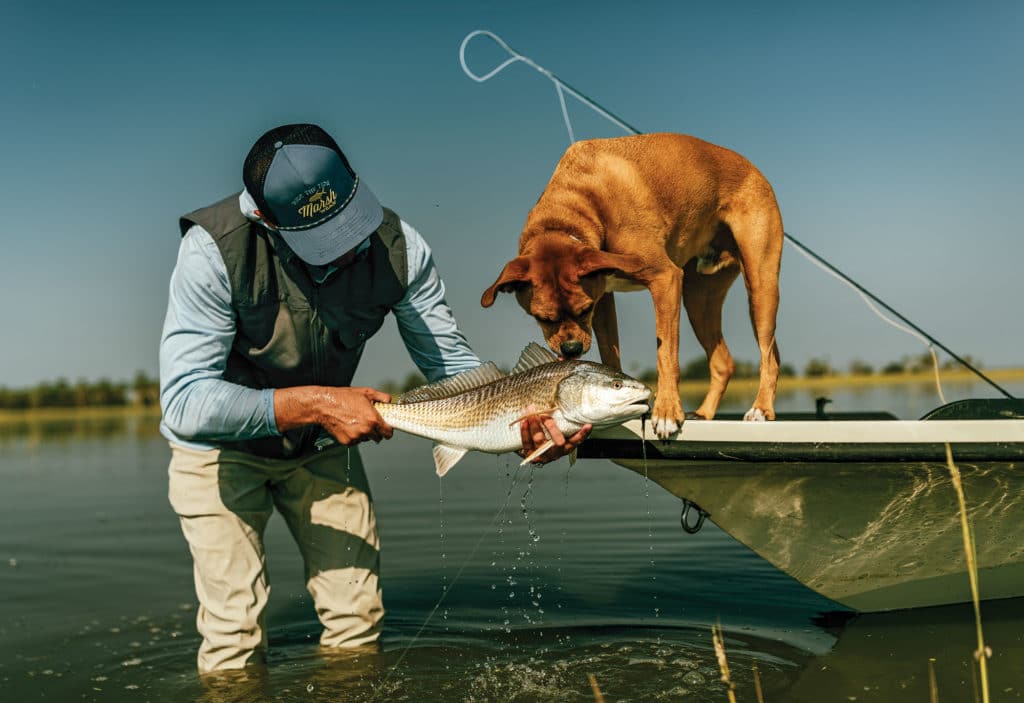 Redfish are just one of the numerous shallow-water- feeding species available to anglers every month of the year.
Dave Lear
Redfish are just one of the numerous shallow-water- feeding species available to anglers every month of the year.
Dave Lear
“OK, we’re gonna cross some really skinny stuff now,” Capt. Luis Flandes shouted over the noise of his jacked-up outboard. Glancing beyond the boat’s low gunwales, blades of sea grass and every fleeing minnow were magnified in the translucent shallows.
“Are you kidding me? This entire lagoon is anorexic,” I laughed in response. Flandes and I were wrapping up a successful day on the lower Laguna Madre and were en route back across to South Padre Island, Texas. After the arctic blast experienced earlier that morning, the second-most mind-numbing aspect of the day was the number of redfish caught on the heels of the cold front. It was one of the many eye-opening surprises of the trip.
As it is with countless other light-tackle enthusiasts, Laguna Madre had long been on my bucket list of fishing destinations. So when the invitation came up, I quickly accepted, despite the late season. It didn’t take long to realize that the inshore opportunities just north of the Mexican border are numerous, regardless of the calendar.
Texas Snook Fishing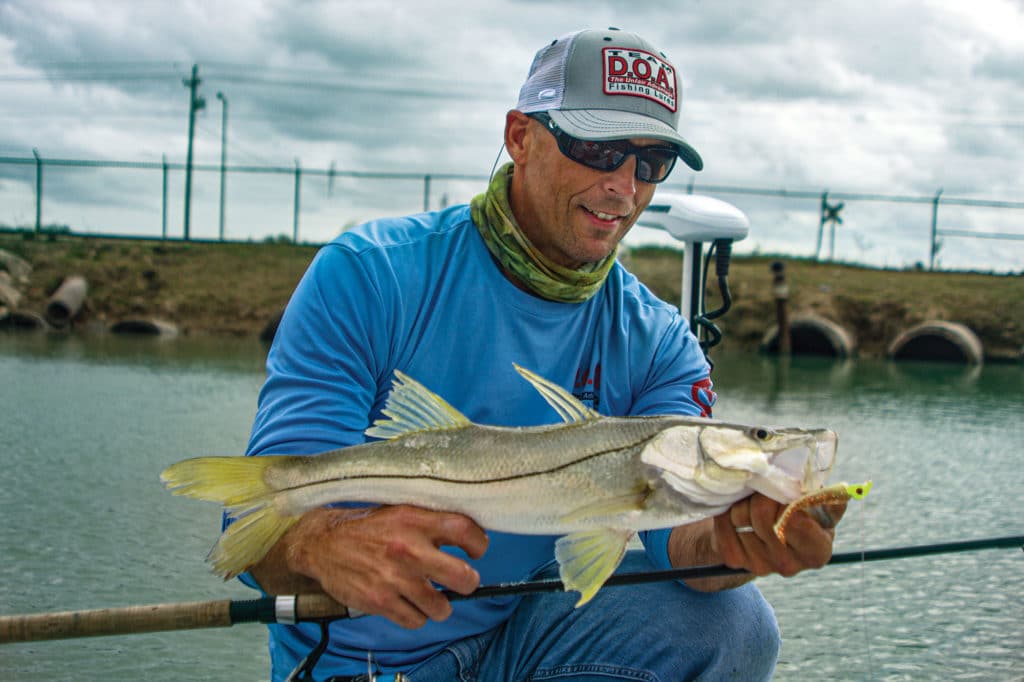 Snook, increasingly common along the southern Texas coast, are best targeted during the cold months of winter.
Dave Lear
Snook, increasingly common along the southern Texas coast, are best targeted during the cold months of winter.
Dave Lear
My initiation started by fishing with captains Brian Barrera and Ed Zyak. Barrera grew up fishing the lagoon and has been guiding professionally for the past six years. After launching his 18-foot Shallow Sport at a nearby ramp, we made the run through the Intracoastal Waterway and into the Brownsville Ship Channel. This industrial zone is not the most scenic, and anchoring isn’t allowed, but the possibility of snook, tarpon and other gamefish makes it intriguing.
“Once the water temperatures dip into the mid-60s, the snook really stack up back in these side canals,” Barrera explains. “Snook are here year-round, but the winter months are the best. You can find schools of more than 100 fish, plus redfish, big trout, tarpon from 5 to 100 pounds, and all the mangrove snapper you want to catch.”
Barrera, whose personal-best snook measured 40 inches, uses the anchor-mode function on his trolling motor to work target areas. He predominately fishes swim baits rigged on a black jig head or 5/0 swimbait hook, a ½-ounce shrimp on a jig head, or 5½-inch jerkbait rigged weedless with a worm hook or a 2/0 circle hook through the nose.
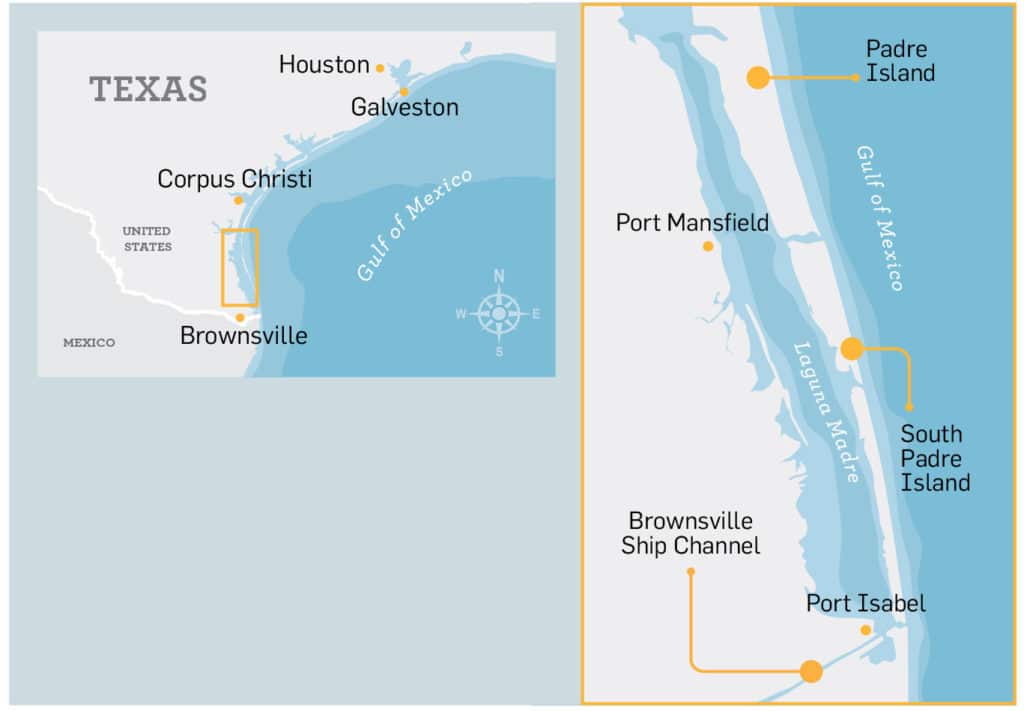 Laguna Madre begins just north of the Mexican border at Port Islabel and offers more than 50 miles of varied terrain, with the mainland on the west shore, and the barrier island complex of Padre Island on the east.
Tim Barker
Laguna Madre begins just north of the Mexican border at Port Islabel and offers more than 50 miles of varied terrain, with the mainland on the west shore, and the barrier island complex of Padre Island on the east.
Tim Barker
“I use side imaging, and you can see all kinds of structure on the bottom,” he says. “The tides aren’t too big in here, up to 18 inches. Water in this area is more wind-driven than affected by current. I like to pick a place apart, since I know where fish like to hide. Then it’s a matter of casting around the structure to see if they are going to eat or not. It’s a challenge, but well worth the effort.”
We boated several small snook and watched some studs ghosting around dock pilings refuse our lures. Redfish kept things interesting, however, with a 33-incher as a nice consolation prize.
“The best action happens between cold fronts,” Barrera says. “The temperatures will be in the high 60s to low 70s, perfect fishing weather with a light jacket and blue jeans. This is the only snook population in Texas fishable year-round. There are more fish here than people realize. We’ll catch them in potholes on the flats during the summer. But the channel is the consistent money spot.”
Shallow Water Fishing in Texas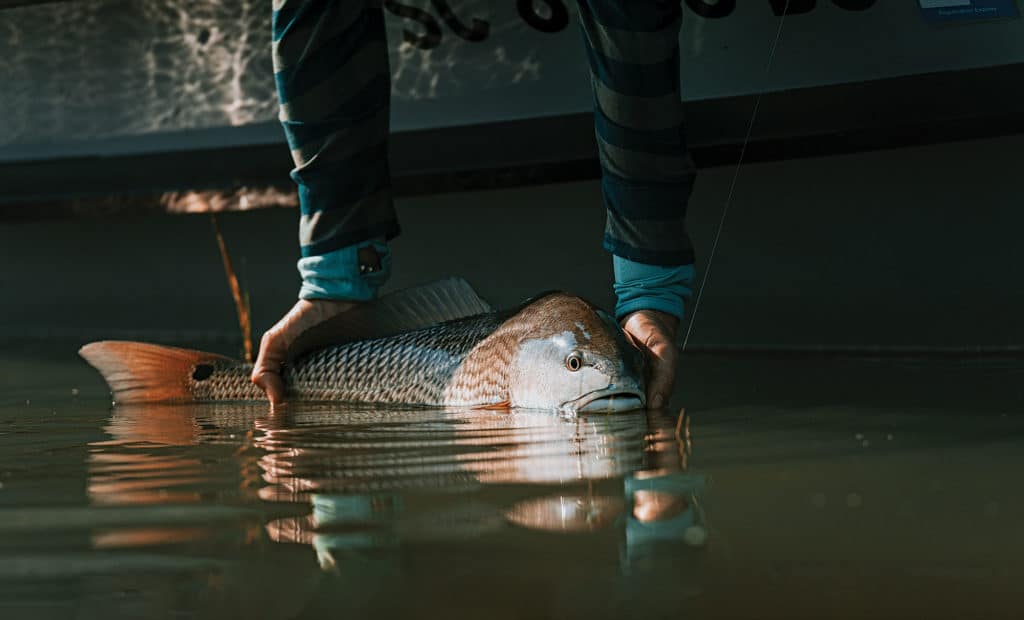 Redfish haunt the shallows in warmer months and station in deeper holes when it gets chilly.
Ryan King
Redfish haunt the shallows in warmer months and station in deeper holes when it gets chilly.
Ryan King
The next day had us shifting into Laguna Madre, and as we zipped east toward Port Isabel and the mainland, Barrera explained the layout of the hyper-saline estuary. Stretching 130 miles, the coastal lagoon system, under various names, spans the length of the barrier islands. Much of the bordering shoreline is either a national wildlife refuge or private ranch land.
“The water to the west is murkier because of the clay bottom. On the island side, it’s crystal-clear, Caribbean-style, with turtle-grass flats, hard sand and lots of potholes. You can drive northeast as far as you can see. The lagoon averages 2 to 3 feet deep, and it’s one of the windiest and saltiest places in the country,” explains Barrera, who specializes in big trout, and releases sows measuring 28 to 30 inches every third or fourth trip.
 A medium action rod and 3000 size reel are ideal for Laguna Madre.
Courtesy of Penn
BUY NOW
A medium action rod and 3000 size reel are ideal for Laguna Madre.
Courtesy of Penn
BUY NOW
He often finds trophies in water so shallow that the fish’s backs are exposed. Huge schools of redfish, with up to several hundred fish, are common in the cooler months too. “It’s great fishing during the winter. You can come out and really whack ’em on artificials,” Barrera says. To prove his point, we picked up a few quality reds and black drum before Barrera’s rod bowed like a rainbow. After scrambling around the bow, he soon shouted for the net. It was a beauty of seatrout, not uncommon in cooler months.
Fishing After a Texas Cold Front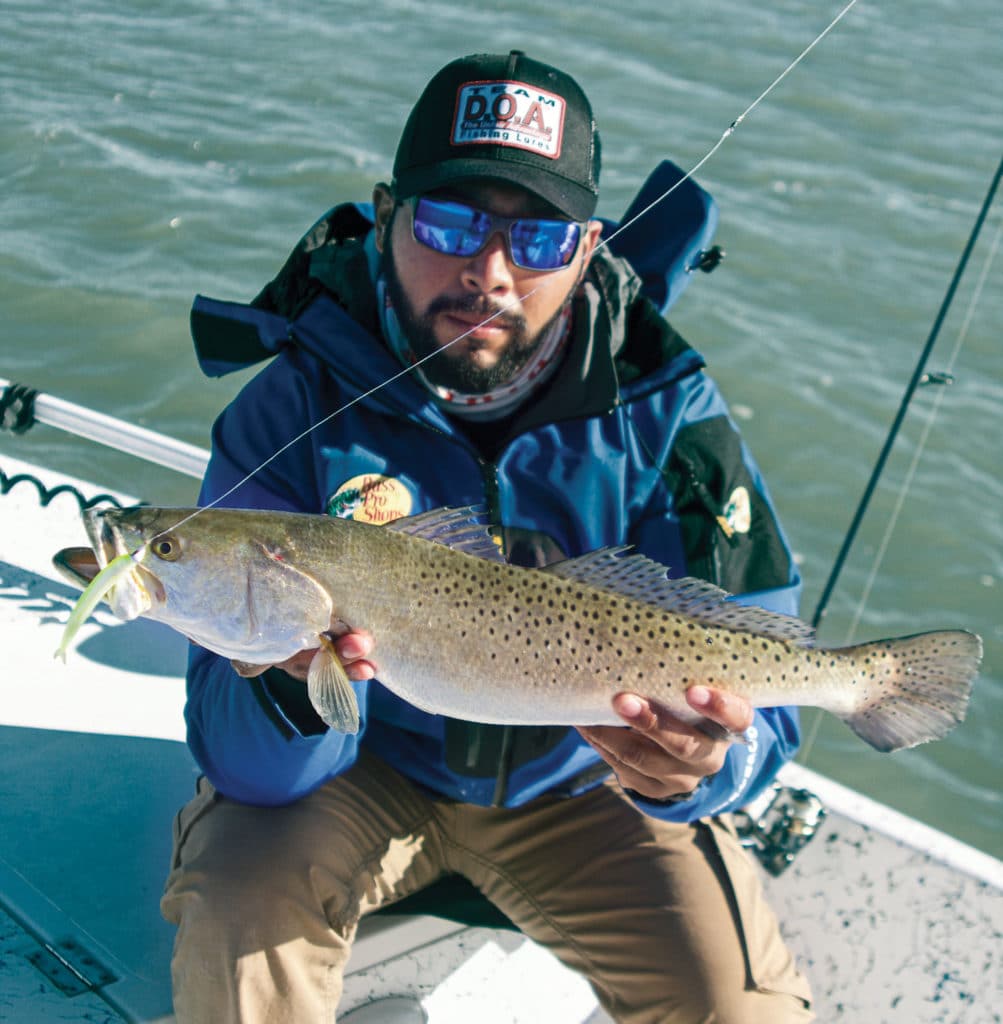 Jerkbaits, versatile and effective, represent a range of speckled trout forage.
Dave Lear
Jerkbaits, versatile and effective, represent a range of speckled trout forage.
Dave Lear
The following day was cold and breezy as I joined Flandes for my last Laguna Madre tutorial. The fish didn’t appreciate the chilly morning, but the temperature climbed into the mid-50s by lunchtime, and the bite turned on as we made slow, methodical drifts in the steady breeze, pitching lures to potholes and cruising redfish. A 4-inch jerkbait in Texas croaker, Fiji chicken, candy corn or Key lime pattern rigged with light, unpainted jig heads proved to be an irresistible combo.
“I prefer lures. You cover a lot more water, and you also get a more diverse bite than by soaking bait. I tell my clients to cast into the potholes and let the lure settle to the bottom,” Flandes explains. “Then work it up and down like a popping cork. The fish are on the bottom, and you don’t get fouled as much, so it’s very effective.”
While doing multiple drifts ranging up to 300 yards, we spotted several red and black drum pushing 40 inches easing away from the boat as we approached. The bull reds remained wary, but their slot-size copper neighbors were more than willing to slam the fake minnows. In a couple of hours, we released more than a dozen reds between 20 and 28 inches, and capped the day with a solid 3-pound trout.
“Normally, we’re picking up more trout mixed in with the reds,” Flandes says. “Most are midslot, 17 to 18 inches, along with some 20-inchers, and a few in the mid-20s thrown in. This cold front may have pushed them into deeper water for the day. But they will surely be back.”
Quick Tips for Fishing South Texas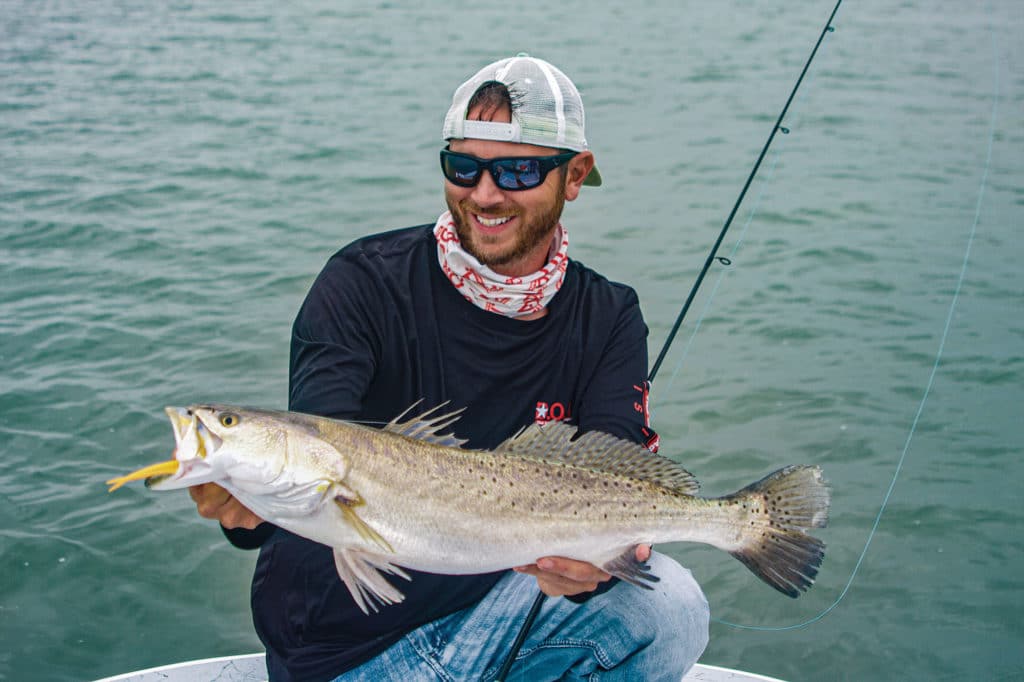 An angler shows off a bruiser of a seatrout (aka speckled trout) from the productive shallows of Laguna Madre.
Dave Lear
An angler shows off a bruiser of a seatrout (aka speckled trout) from the productive shallows of Laguna Madre.
Dave Lear
- What: Snook, redfish, spotted seatrout, black drum, flounder, tarpon
- Where: Laguna Madre, Texas, inshore
- When: Year-round
- Rods: Medium-action spinning for the lagoon; medium-heavy spinning for the ship channel
- Reels: 2500- to 3000-class spinning for the lagoon; 4000-class for the ship channel
- Lines: 10-pound braid with 25- to 30-pound fluorocarbon leaders on the light spinners; 20- to 30-pound braid with 30- to 50-pound leaders on the heavier outfits
- Bait: Live finger mullet or ballyhoo chunks; live shrimp for mangrove snapper
- Lures: Soft plastics are tough to beat.
The post Fishing South Padre Island, Texas appeared first on Salt Water Sportsman.
- Home
- About Us
- Write For Us / Submit Content
- Advertising And Affiliates
- Feeds And Syndication
- Contact Us
- Login
- Privacy
All Rights Reserved. Copyright , Central Coast Communications, Inc.